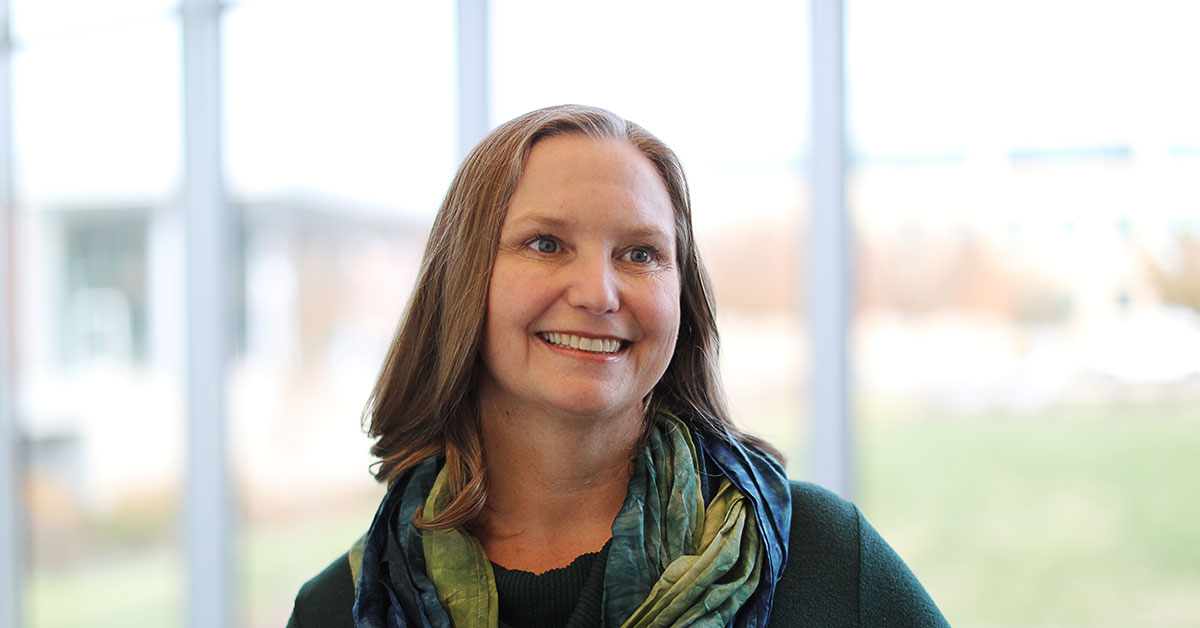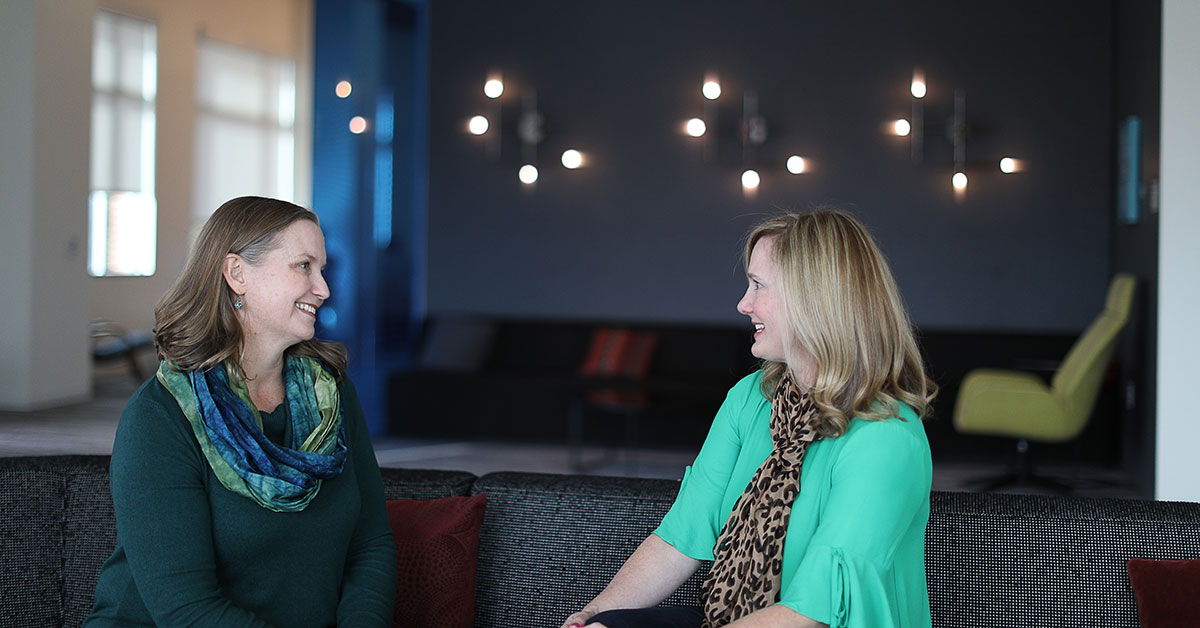Copyright ©2021 Capital One. Opinions are those of the individual author. Statements are deemed accurate at the time of posting. Unless otherwise noted, Capital One is not affiliated with, or endorsed by, any company mentioned. All trademarks and intellectual property used or displayed are the property of their respective owners.
How an Unconventional Career Path Led from Scuba Diving to Cyber Risk Management
By Amber Smirnow
Amber is a Cyber Risk Manager at Capital One.
How do you think about your career path? Like many people, you may think of career evolution in terms of starting as an intern and climbing the ladder or reaching the top of your field as a subject matter expert. But building a career that brings you both personal growth and the opportunity to learn new things can mean switching roles and even industries. When I look at my career path—a journey that has taken me from teaching scuba diving in the Caribbean to diving into the world of Cyber Risk Management—it looks like a spiral. In every career phase, I build on what I’ve learned and take my career in completely new directions.

Four types of careers
I once attended a talk about finding happiness at work, and the speaker mentioned the four types of career paths: linear, expert, spiral and transitory. These four types represent a variety of different paths one could take on their career journey. Some people find their path early on, and others, like myself, experience all of these paths at different points in their lives.
Linear
Growing up, I always assumed that I was destined for a linear career path of climbing the corporate ladder. Many people also think this is the way to grow your career because it is the typical career path described in textbooks. It looks like stairs or a ladder—you start at the bottom and gradually move up, one step at a time. Sound familiar?
Because I am motivated by achievement, I did well in school, skipped several grades and started college when I was 15. I thought that after graduation, I would go on to do great things for my chosen company and work my way up through the ranks. A linear career path made perfect sense to me and the steps were clear. I could get an MBA, find a sponsor and start off on my path climb the ladder. Life, learning and opportunity led me in a different direction, however.
Expert
While I was in college, I began to sway from my corporate and linear career aspirations. I felt at home in the academic world, a field you could consider the expert career path. An expert career path means really digging in and going deep into one exact area of study or expertise. Think about a college professor—they can spend their entire career on one particular subject area, exploring all aspects and becoming the authority on that subject.
I love to research, write and go deep into a subject area. I majored in Literary Studies and by my senior year, I was writing my thesis on Women in Russian Folklore. I was 18 years old and picturing myself with a career in higher education; I would make my mark on the world as a professor. I would get a PhD, find a mentor and fully immerse myself in my field of expertise.

But by the end of my senior year, I wasn’t quite ready to commit to the life of academia. I also love to travel and try new things. So I saved up and, after graduation, I backpacked around Russia and Europe for a few months until I ran out of money and had to get a job.
Transitory
With that, I was onto my third career trajectory: transitory. A transitory career path is exactly what it sounds like—moving with the money or following a seasonal pattern in your career. Think of certain types of sales jobs that have people hopping from one place to the next or seasonal jobs, like ski instructors, that only occur at certain times of the year.
For me, in this phase of my career, I would simply work for long enough to save some money, then travel for a few months. I moved to the Caribbean and started teaching scuba diving. It’s a great way to have an expensive hobby on a budget because I could work for free at a dive shop in exchange for free air fills and boat rides to the reef. I island-hopped for a while, then spent several years working at a summer sailing camp for teenagers in the British Virgin Islands. We lived on board 50-foot sailboats all summer, and I had no expenses. I’d get a paycheck at the end of the summer and travel during the off-season. I spent three months in Africa one year, three months in Australia the next. Everywhere I went, I made friends with local people and fellow travelers, and I heard the best stories. These stories inspired me, and I decided to go to grad school for Journalism.

Spiraling into a new and unexpected career
After grad school, I ended up in Key West teaching scuba again, but I didn’t feel transitory anymore. I found that I am motivated by personal growth and a love of learning new things. To me, each step in my career was an opportunity to reinvent myself, take what I knew and build on it in a different direction. And that’s what a spiral career path is—it’s neither linear, expert or transitory but a mix of all of them, gradually building on a diverse set of skills to create a career that makes sense to you.
For me, it meant completing training in the more technical aspects of scuba diving. I got certified as a mixed-gas blender and I took the Coast Guard exam and qualified for my 50-ton captain’s license. Everything I was learning felt like it was leading to something, and each turn in the spiral of my career connected me to the next person and the next place in my journey.
At this point in my life, I was starting to think about home ownership and someday starting a family. My experience and interest led me to start exploring the technology field. I eventually joined a consulting firm in Richmond, Virginia to become a Business Systems Analyst (BSA), specializing in implementing Content Management Systems.

It was a great fit, because I loved talking to the business and understanding their pain points. But I also loved working with the development team and building solutions. I wrote technical requirements. I created and presented training materials. I made friends, and even as I moved on to other roles, I kept in touch with those contacts.
When the career light bulb goes off
Flash forward, and I was having lunch with my friend Melissa who was saying how nice it would be if we worked together again. We had worked together as consultants when I was a BSA and she was a Tech Lead. After consulting, we both joined Capital One in different areas. I became a Technical Product Manager, and she was in Cyber Risk Management. She loved her job and the work she was doing, and now she wanted me to join her! A light bulb went off in my head.
Thinking about my career spiral, I was able to see how this was the next logical step. Folklore and Journalism are about creating clarity and shared understanding. And sailing, scuba diving and software engineering are all about Risk Management. So at each turn in my spiral, I had been growing and learning... how to tell the story, how to help make sense of technology and how to understand the risks so we can decide whether to accept them.

At Capital One, I found a really great career support system. Here you can find our network of Business Resource Groups (BRGs) that support diverse perspectives. You have encouragement from leaders and mentors and friends. And so here I am, on the Cyber Risk Management team. I have interesting work, lots to learn and the feeling that I have found where I belong. I feel as though my experiences in life prepared me in a unique way to tackle the challenges that my latest position presents. There were twists and turns along the way, but ultimately my spiral path led me to a rewarding career.
When considering your next career move, I encourage you to examine not only what you should do but where it will take you. Remember—you may not know at that exact moment how, say, the transitory life of a scuba instructor will someday land you a position in a Fortune 100 company, and that’s ok! The one thing that I can say will lead you to success is an obsession with learning and growing your skills. Whether you see yourself on the linear, expert, transitory or spiral path, growing your career is contingent on growing yourself. So keep an open mind, don’t get discouraged and follow your own path—you never know where it might lead!

